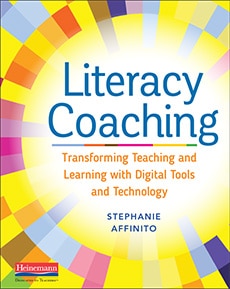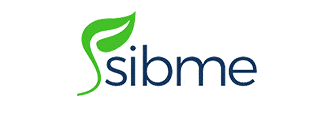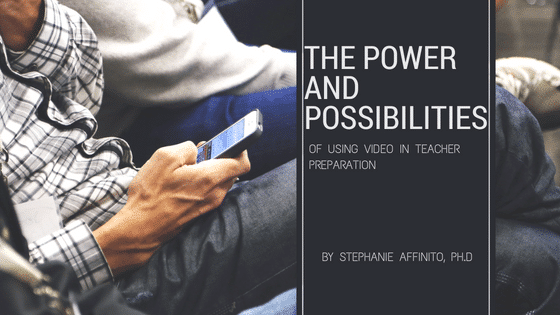I am a literacy teacher educator and have dedicated my career to building teacher expertise. More than ever, our students deserve teachers who understand how literacy develops, have strong content and pedagogical knowledge and connect with students to ensure instruction is engaging, authentic and relevant. This begins with a strong teacher preparation program as this kind of expertise is built over time, content and practice and is driven by the strengths, needs and interests of the learners in front of them. To achieve this, we must shift the way we work with our future teachers to engage them in mindful practice, cultivate a mindset of lifelong learning and transform their ideas of instruction. Technology and digital tools can support these efforts to make teacher learning more meaningful, relevant and authentic.
Digital tools can connect educators together, cultivate a personal learning network, facilitate collaborative lesson planning and intentional reflection, provide access to literature and research to build knowledge and showcase teaching and learning efforts. Put simply, technology has the potential to strengthen teacher expertise and build competence and confidence to ultimately impact students. The use of video has particular potential to reflect on pedagogical practices, build expertise and ultimately, transform instruction for students.
Here are three ways that I use video to transform teacher preparation:
Observe Mentor Practices
Educators must take an inquiry stance to teaching and learning. We must be keen observers and reflect on those observations to think through new content, learn new instructional practices and reflect on our own teaching. In my experience, preservice teachers tend to teach what they know based on their own experiences during their schooling. It is my job as a teacher educator to acknowledge those experiences and widen teachers’ perspectives on what is possible for the classroom. We read, write and reflect about new ideas and practices, but actually seeing a concept or instructional routine in action helps teachers envision their possibilities. Teachers deserve multiple examples of what effective instruction might look like to develop their expertise and affirm their beliefs that they too can engage in such instruction.
I use a simple template to guide my observations of mentor instruction with my teachers. I focus on four broad areas:
- The classroom environment
- Student engagement
- Literacy instruction
- Literacy content.
We take notes on what we notice and wonder about to guide our reflective conversations after our observation. Together, we reflect, question and learn together, guided by the mentor practices of others.
Observe Real Practices
Mentor practices are incredibly important to help imagine the possibilities for effective instruction. But as a literacy teacher educator, I have found there is even more power in observing ‘real’ classroom practices.
You know…
- The lessons that did not go as planned
- The students that were not as engaged as we hoped
- The materials that did not quite support the task.
I am a firm believer that there is no such thing as a failed lesson as long as we learn from the experience. When we view videos of ‘real’ teachers with ‘real’ students in ‘real’ classrooms, we can talk about the realities and complexities of the classroom, something future teachers will have to navigate in real time.
In class, I play a ‘real’ lesson and ask my teachers for two things: what they notice and what they wonder about. Together, we name the practices that contributed to a successful lesson and we wonder about the choices the teacher made. We hypothesize the logic for instructional decisions and in some cases, suggest alternatives based on their new learning. My students often identify with these ‘real’ lessons and reflect on their own practices they now realize they can shift. By engaging in these collegial observations, we shift our perceptions of observations from one of evaluation to one of collegial learning. And that has the potential to shift the entire landscape for learning together.
Reflect on Instruction
We must infuse teacher education with supportive, clinically rich practices: real life practicums and experiences in classrooms and schools to gain experience teaching and learning. Videotaping and reflecting on those instructional experiences can make an incredibly powerful impact on teacher learning.
In one of my graduate classes, teachers learn a framework for early literacy intervention and work weekly with students. Each night, we debrief after our time with students and engage in conversations about our learning. To support reflection, teachers videotape their instruction to reflect on their teaching and connect their practices to the content they are learning. They annotate their videos with comments and questions and share particular lessons and lesson segments with me for personalized coaching and feedback. Together, we reflect on their developing teaching skills and strengthen their responsive instruction to support student learning. These powerful practices may move us out of our comfort zones, but by doing so, we lead our learning forward.
Using video in teacher education has the potential to deepen our developing understandings about teaching, help reflect on and question our own practices and even search for answers to those questions. Together, teacher educators and preservice teachers work from a place of authentic inquiry to envision instruction and strengthen their own teaching and learning for the sake of their future students.
 Stephanie Affinito, a former classroom teacher and literacy specialist, is a literacy teacher educator at the University at Albany. She has a deep love for literacy coaching and supporting teachers’ learning through technology, and she presents nationally on this topic. You can find her online at stephanieaffinito.com and on Twitter. She recently published the book “Literacy Coaching: Transforming Teaching and Learning with Digital Tools and Technology.”
Stephanie Affinito, a former classroom teacher and literacy specialist, is a literacy teacher educator at the University at Albany. She has a deep love for literacy coaching and supporting teachers’ learning through technology, and she presents nationally on this topic. You can find her online at stephanieaffinito.com and on Twitter. She recently published the book “Literacy Coaching: Transforming Teaching and Learning with Digital Tools and Technology.”



